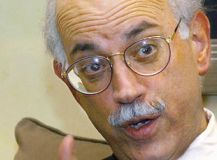Sudan balks at giving US envoy a visa
Sept 29, 2006 (WASHINGTON) — Sudan appears to be balking at granting a visa to the new U.S. special envoy for Sudan, Andrew Natsios, and is restricting the movement of all U.S. officials to Khartoum, the State Department said on Friday.
 Relations have deteriorated sharply in recent months between Washington and Sudan, which is under growing international pressure to allow a U.N. force into its war-torn Darfur region.
Relations have deteriorated sharply in recent months between Washington and Sudan, which is under growing international pressure to allow a U.N. force into its war-torn Darfur region.
“He (U.S. special envoy) has not been granted a visa yet. Certainly, I think Andrew (Natsios) would very much want to travel to Khartoum. We are having some difficulties now with the Sudanese government,” said State Department spokesman Sean McCormack, who declined to provide specific details.
Sudanese President Omar Hassan al-Bashir said last weekend his government would impose a travel ban on U.S. officials confining them to Khartoum. That would rule out any visits to Darfur region.
“They’ve placed certain restrictions on our ability to travel outside a 25-kilometer (16-mile) limit (from Khartoum), I believe,” said McCormack.
He added, “We don’t think that it should be in place for anybody in our mission there … it makes it harder for everybody to do their work.”
Sudan, which said the travel restrictions followed similar ones placed on Sudanese officials in the United States, has flatly rejected a U.N. force for Darfur, saying its presence there would amount to “colonialism.”
McCormack said the United States would continue to put pressure on Khartoum to accept a 20,000-strong U.N. force to replace about 7,000 poorly funded African Union troops struggling to keep the peace in the arid region.
“We think it is important that other states apply similar pressure to the Sudanese government,” said McCormack.
The African Union’s mandate in Darfur was set to expire this week but has been extended until the end of the year.
An estimated 200,000 people have been killed in Darfur since 2003 and more than 2.5 million people displaced in fighting between rebels, the government and militias.
In recent weeks, the humanitarian situation has deteriorated further as Sudan’s government launched a new military offensive.
Earlier this week, U.S. Secretary of State Condoleezza Rice said Sudan should choose between “cooperation and confrontation” and accept the U.N. force, indicating the United States was contemplating punitive measures against Khartoum.
Outgoing U.N. Deputy Secretary-General Mark Malloch Brown told the Independent newspaper in London that Washington should stop making such idle threats as Khartoum did not believe they would be backed up with action.
Asked about Malloch Brown’s reported comments, McCormack said the senior U.N. official should “apply himself to the task at hand rather than giving speeches.”
(Reuters)
